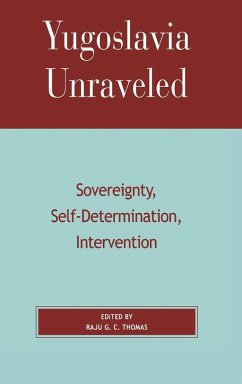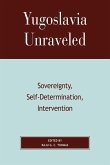Editor Raju G. C. Thomas and contributors examine underlying issues regarding the sources of religious nationalism and ethnic conflict, the territorial integrity and sovereignty of states, and the principle of self-determination and the right of secession from an existing state.
Hinweis: Dieser Artikel kann nur an eine deutsche Lieferadresse ausgeliefert werden.
Hinweis: Dieser Artikel kann nur an eine deutsche Lieferadresse ausgeliefert werden.
For anyone who wants to understand how Yugoslavia a country that once punched above its weight unravelled with such disastrous results, this book provides a clear and detailed analysis. The South Slav Journal Yet another addition to the bookcases of volumes on the latest Balkan wars, you ask? But this collection of essays assembled by Raju G.C. Thomas, and complemented by his own, is something different. Drawing on his personal background, Thomas ventures, credibly, that what is described in Yugoslavia Unraveled could have happened to his native India, too, if it had been a small country and lacked nuclear weapons. He and the other authors go on to explore the tragedies of self-determination gone amok, of 'morality as a product of power' on the part of big interventionist countries, of the destructive role that 'advocacy scholarship' and the new 'government-media-academia-complex' played in tearing Yugoslavia apart during the 1990s. In short, a valuable work. -- David Binder, New York Times Yugoslavia Unraveled should be required reading for the enthusiasts of humanitarian U.S. interventionism and for the policy-makers who have prematurely declared the Balkan tragedy a 'success story.' The contributors to this compendium offer solid evidence that highlights the inherent dangers of using ethnic stereotyping as a substitute for the rule of law. -- Nikolaos A. Stavrou, Editor of Mediterranean Quarterly This volume is a necessary corrective to the way the history of the breakup of Yugoslavia has been constructed for the public. Never has it been so important to counter the big lie of 'humanitarian intervention' that was undertaken by noble Western nations to 'save' the Balkans. This book collects incisive works by top scholars in a range of disciplines, delivering a clear and compelling analysis uncommon for edited collections. -- Robert Jensen, University of Texas-Austin This book makes two contributions one theoretical and one historical. The human tragedies of the last decade?s civil wars precipitated an emerging view among many statesmen, international lawyers, human rights activists, and analysts that the sovereigntyprinciple should be eroded. States that are hard on their people should lose their customary international legal right to be free from foreign intervention. Instead, outside powers can and should intervene to put things right when governments fighting fortheir survival fail to conform to others? principles and norms. This book traces how the attack on sovereignty emerged during Yugoslavia?s dissolution, and how it contributed to that dissolution. It directs attention to the negative consequences that didarise, and will arise, once the sovereignty principle is compromised. Yugoslavia?s dissolution produced a body of historical, autobiographical, and analytic publications much of it impressive, but much of which also succumbed to the temptation of attributing evil outcomes to evil men mostly evil Serbian men, and good outcomes to good men and women, mostly U.S. and western European. This book marks the beginning of a new approach to the understanding of these important and tragic events, a more historica -- Barry Posen, M.I.T. Yugoslavia Unraveled presents a comprehensive account of a subject many wish to forget, with all its failures and successes, heroes and villains. It deserves a wide readership. No student or scholar in political science should be without it -- Damjan de Krnjevic-Miskovic The National Interest Most of the diverse essays in this collection hold a common theme: that Western policy regarding the demise of Yugoslavia has been clumsy at best, and at worst has caused unnecessary damage and loss of life in the region. The consistent presentation of different aspects of this thesis provides a nice thread bewteen the pieces that is quite rare in edited collections. Nationalities Papers Yugoslavia Unraveled is a welcome and important work... This book is important both for what it teaches us about the conduct of foreign policy during the 1990's and for what it tells us about policy in the twenty-first century... Thomas's instincts were correct, and he is to be commended for assembling a fine collection that is sure to stand the test of time... -- Christopher Preble, Director, Foreign Policy Studies, The Cato Institute, Washington D.C. ...The volume must be judged as a much-needed contribution to scholarship by providing antitheses to the theses of the dominant paradigm of Balkan politics. As such, Yugoslavia Unraveled will be appreciated not only by advanced students of Balkanology but also by those working in the broader fields of political philosophy and international relations. -- Andrew C. Janos, University of California, Berkeley Perspectives on Political Science Yugoslavia Unraveled is a welcome and important work that reviews the international community's policies toward Yugoslavia in the 1990s. Mediterranean Quarterly Many books have been written about the break-up of the former Yugoslavia. But it is doubtful if there will be a more comprehensive overview of the Balkans imbroglio than Yugoslavia Unravelled...For anyone who wants to understand how Yugoslavia - a country that once punched above its weight - unravelled with such disastrous results, this book provides a clear and detailed analysis. Slavic Review This is a solid and comprehensive volume that assembles new and previously published insightful works by a range of scholars and politicians, and delivers a compelling analysis of the collapse of the former Yugoslavia. -- Joe Mocnik, Bowling Green State University This book achieves the aims of its editor very well, and even those who disagree with all or parts of it will find their convictions tested by reading the measured, incisive and scholarly arguments presented here. -- Leslie Benson, Northampton University Anyone seeking to understand the dismemberment of the former Yugoslavia will find ample reward in this collection. It is a worthy contribution to scholarship and to the unearthing of truth in a highly contested political field. Raju G. C. Thomas is to be thanked for bringing these contributions together. Global Dialogue Yugoslavia Unraveled makes a solid contribution to our understanding of the Balkan tragedies of the 1990s. The book shows clearly how the Western powers undermined Yugoslavia' s sovereignty and thereby helped cause the ensuing bloodshed and chaos. The policies pursued by those powers have implications far beyond the Balkans and are likely to haunt the international community for decades to come. Thomas has written a powerful account that should be must reading for policymakers and interested laymen alike. -- Ted Galen Carpenter, Cato Institute This book makes two contributions one theoretical and one historical. The human tragedies of the last decade's civil wars precipitated an emerging view among many statesmen, international lawyers, human rights activists, and analysts that the sovereignty principle should be eroded. States that are hard on their people should lose their customary international legal right to be free from foreign intervention. Instead, outside powers can and should intervene to put things right when governments fighting for their survival fail to conform to others' principles and norms. This book traces how the attack on sovereignty emerged during Yugoslavia's dissolution, and how it contributed to that dissolution. It directs attention to the negative consequences that did arise, and will arise, once the sovereignty principle is compromised. Yugoslavia's dissolution produced a body of historical, autobiographical, and analytic publications much of it impressive, but much of which also succumbed to the temptation of attributing evil outcomes to evil men mostly evil Serbian men, and good outcomes to good men and women, mostly U.S. and western European. This book marks the beginning of a new approach to the understanding of these important and tragic events, a more historically familiar tale distributing responsibility among multiple parties, inside and outside- parties with mixed motives, poor information, bad theories, limited political skill, and malleable principles. -- Barry Posen, M.I.T.








